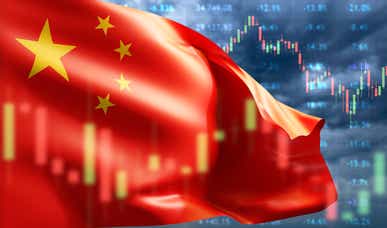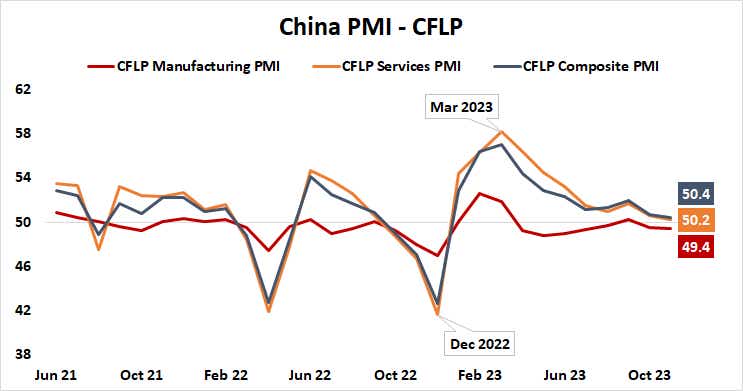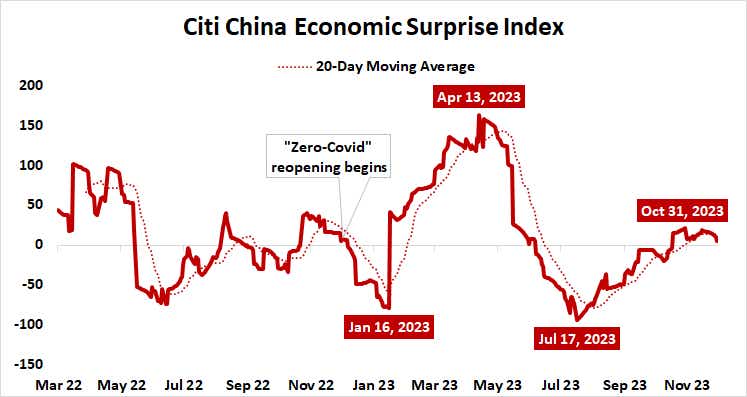Trading China Weakness: Australian Dollar Looks Better vs. Stock Market

Trading China Weakness: Australian Dollar Looks Better vs. Stock Market
By:Ilya Spivak
China’s economy slowed to its weakest point this year, and more pain appears likely
- November PMI data says China’s economy has slowed to its weakest point in 2023.
- More pain looks likely as a global recession could be on the horizon in 2024.
- The Australian dollar looks like a better vehicle to trade this trend vs. Chinese stocks.
It has been almost a year since China began reopening after scrapping its restrictive “zero-COVID” policy of mass lockdowns. The results have underwhelmed, to say the least.
Investors were filled with optimism as Beijing began loosening the reins in December 2022, hoping for a big-splash recovery. It happened just as the Federal Reserve and other major central banks were seen nearing the end of a blistering rate hike program sometime by mid-2023. A lucrative year of meaty returns seemed to be just on the horizon.
This exuberance proved short-lived. A brief surge in service-sector demand powered by the unshackling of Chinese consumers crested by March. An anemic reopening push on the manufacturing side had already run out of steam a month earlier. It has been all downhill from there.
China’s economy: going from bad to worse
November’s official set of purchasing managers’ index (PMI) readings from the China Federation of Logistics and Purchasing (CFLP) painted a dismal picture. The factory sector shrank for a second consecutive month while services eked out a barely-there expansion. In all, it was the slowest month for economic growth this year.

China shook off pandemic restrictions over a year after its main customers in the U.S. and Europe. By then, the customers were busy diversifying away from China-dependent supply chains. They’d also come down from a pop of sharp catch-up economic growth linked to their own reopening, exhausting most of the stimulus money left in consumers’ pockets.
The way back to prosperity looks tenuous. China looks to have suffered lasting damage to its role as the go-to middle step in the global supply chain. It will be difficult to win back lost market share as key trading partners bristle at Beijing’s sharp-elbowed approach to geopolitics in recent years. Diplomatic efforts at mending fences are off to a slow start.
Meanwhile, demand will be hard to come by even if everyone decides to play nice again. PMI data from S&P Global and JPMorgan tracking worldwide economic activity showed that it came to a standstill in October. More pain is likely ahead as the full impact of dramatic interest rate hikes is absorbed.
The Federal Reserve has estimated that the economy can take 12 to 18 months to totally reflect a single rate hike. Assuming an average lag of 15 months on that basis, it looks as though less than half of the U.S. central bank’s tightening cycle has been accounted for. That leaves plenty of pain to be suffered through in 2024.
Trading China’s economic weakness: the Australian dollar
Finding the trade to capture this trajectory in Chinese stock markets seems challenging, at least for now. They’ve vastly underperformed. Wall Street is nearly 20% on the year and emerging markets excluding China have added 11.4%. China’s benchmark CSI 300 index is down 12.3%.

Chasing prices lower from here seems to demand that some sort of narrative-altering negativity needs to emerge. That has been hard to come by. Data from Citigroup reveals Chinese economic data outcomes have started to outperform relative to expectations because the forecasts themselves have been sharply downgraded.
The Australian dollar may be a better vehicle. It has roared higher against its U.S. counterpart since late October, echoing an upswell of risk appetite across global financial markets animated by hopes for the start of a Fed rate cut cycle. As the prospect of global recession appears increasingly likely, support may fade.
The so-called “Aussie” is especially sensitive to China’s business cycle. The East Asian giant edged out Japan as Australia’s top trading partner in 2007 and has retained its perch ever since, despite an upswell in tensions between Beijing and Canberra over recent years. The currency may be quick to rediscover gravity as growth concerns retake center stage.
Ilya Spivak, tastylive head of global macro, has 15 years of experience in trading strategy, and he specializes in identifying thematic moves in currencies, commodities, interest rates and equities. He hosts Macro Money and co-hosts Overtime, Monday-Thursday. @Ilyaspivak
For live daily programming, market news and commentary, visit tastylive or the YouTube channels tastylive (for options traders), and tastyliveTrending for stocks, futures, forex & macro.
Trade with a better broker, open a tastytrade account today. tastylive, Inc. and tastytrade, Inc. are separate but affiliated companies.
Options involve risk and are not suitable for all investors. Please read Characteristics and Risks of Standardized Options before deciding to invest in options.
tastylive content is created, produced, and provided solely by tastylive, Inc. (“tastylive”) and is for informational and educational purposes only. It is not, nor is it intended to be, trading or investment advice or a recommendation that any security, futures contract, digital asset, other product, transaction, or investment strategy is suitable for any person. Trading securities, futures products, and digital assets involve risk and may result in a loss greater than the original amount invested. tastylive, through its content, financial programming or otherwise, does not provide investment or financial advice or make investment recommendations. Investment information provided may not be appropriate for all investors and is provided without respect to individual investor financial sophistication, financial situation, investing time horizon or risk tolerance. tastylive is not in the business of transacting securities trades, nor does it direct client commodity accounts or give commodity trading advice tailored to any particular client’s situation or investment objectives. Supporting documentation for any claims (including claims made on behalf of options programs), comparisons, statistics, or other technical data, if applicable, will be supplied upon request. tastylive is not a licensed financial adviser, registered investment adviser, or a registered broker-dealer. Options, futures, and futures options are not suitable for all investors. Prior to trading securities, options, futures, or futures options, please read the applicable risk disclosures, including, but not limited to, the Characteristics and Risks of Standardized Options Disclosure and the Futures and Exchange-Traded Options Risk Disclosure found on tastytrade.com/disclosures.
tastytrade, Inc. ("tastytrade”) is a registered broker-dealer and member of FINRA, NFA, and SIPC. tastytrade was previously known as tastyworks, Inc. (“tastyworks”). tastytrade offers self-directed brokerage accounts to its customers. tastytrade does not give financial or trading advice, nor does it make investment recommendations. You alone are responsible for making your investment and trading decisions and for evaluating the merits and risks associated with the use of tastytrade’s systems, services or products. tastytrade is a wholly-owned subsidiary of tastylive, Inc.
tastytrade has entered into a Marketing Agreement with tastylive (“Marketing Agent”) whereby tastytrade pays compensation to Marketing Agent to recommend tastytrade’s brokerage services. The existence of this Marketing Agreement should not be deemed as an endorsement or recommendation of Marketing Agent by tastytrade. tastytrade and Marketing Agent are separate entities with their own products and services. tastylive is the parent company of tastytrade.
tastyfx, LLC (“tastyfx”) is a Commodity Futures Trading Commission (“CFTC”) registered Retail Foreign Exchange Dealer (RFED) and Introducing Broker (IB) and Forex Dealer Member (FDM) of the National Futures Association (“NFA”) (NFA ID 0509630). Leveraged trading in foreign currency or off-exchange products on margin carries significant risk and may not be suitable for all investors. We advise you to carefully consider whether trading is appropriate for you based on your personal circumstances as you may lose more than you invest.
tastycrypto is provided solely by tasty Software Solutions, LLC. tasty Software Solutions, LLC is a separate but affiliate company of tastylive, Inc. Neither tastylive nor any of its affiliates are responsible for the products or services provided by tasty Software Solutions, LLC. Cryptocurrency trading is not suitable for all investors due to the number of risks involved. The value of any cryptocurrency, including digital assets pegged to fiat currency, commodities, or any other asset, may go to zero.
© copyright 2013 - 2026 tastylive, Inc. All Rights Reserved. Applicable portions of the Terms of Use on tastylive.com apply. Reproduction, adaptation, distribution, public display, exhibition for profit, or storage in any electronic storage media in whole or in part is prohibited under penalty of law, provided that you may download tastylive’s podcasts as necessary to view for personal use. tastylive was previously known as tastytrade, Inc. tastylive is a trademark/servicemark owned by tastylive, Inc.
Your privacy choices